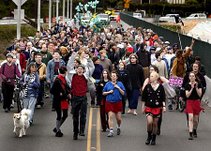[olympiaworkers] [Fwd: [nwanarchy] This Saturday: Celebrating Seattle's Striking History]
I think it would be nice if we had a field trip for this. I'm going to
suggest that if anyone wants to head up, meet at the well on 4th Ave at
11am saturday.
see you there.
Brendan
---------------------------- Original Message ----------------------------
Subject: [nwanarchy] This Saturday: Celebrating Seattle's Striking History
From: "Andrew hedden" <mourningcommute@yahoo.com>
Date: Tue, February 3, 2009 3:30 pm
To: nwanarchy@lists.riseup.net
--------------------------------------------------------------------------
Saturday, February 7:
Celebrating Seattle's Striking History: 90th Anniversary of the 1919
Seattle General Strike
Location: Seattle Labor Temple, 2800 1st Ave, downtown Seattle
Time: Doors at 12:30pm, Program 1pm - 5pm
Free!
Join the Bridges Center as we commemorate the 90th anniversary of
Seattle's General Strike. Presentations and performances will revisit the
event, followed by discussions of the strike’s legacy for today.
Including:
HISTORICAL LEGACIES OF THE I.W.W. AND WORKERS CONTROL
Howard Kimeldorf (Sociology, University of Michigan)
THE LOST HISTORY OF THE SEATTLE/SEIATEL COMMUNE
Robert Cherny (History, San Francisco State)
SEATTLE 1919: A MUSICAL HISTORY
Seattle Labor Chorus with Rob Rosenthal
MUSICAL PERFORMANCES
The Anti-Fascist Marching Band
Jess Grant, songs to provoke and amuse
DISCUSSION: IMMIGRANT RIGHTS, ORGANIZING AND THE FUTURE
Facilitated by Rosalinda Guillen, Community to Community Development
HISTORICAL DISPLAYS
REFRESHMENTS
AND MORE!
Sponsored by the Harry Bridges Center for Labor Studies (University of
Washington), Pacific Northwest Labor History Association, the Center for
the Study of the Pacific Northwest, Amalgamated Transit Union 587, and the
ML King County Labor Council.
For more information, call (206) 543-7946, e-mail pcls@u.washington.edu,
or visit http://depts.washington.edu/pcls
Ninety years ago Seattle shut down. Shipyard workers went on strike for
higher wages and more than 100 other unions joined the strike in sympathy.
Stores closed. Streetcars and taxis stop running. Wealthy families fled
the city. President Woodrow Wilson ordered troops from Fort Lewis to
Seattle to, if necessary, maintain order.
Feb. 6, 1919 marked the beginning of what became known as the Seattle
General Strike, an event that made headlines around the world and ignited
an era of labor unrest following World War I.
To commemorate the event, union members, scholars, students, community
organizers and musicians will come together at Seattle’s Labor Temple on
Feb. 7 to mark the 90th anniversary of the Seattle General Strike.
Presentations and performances will revisit the event, followed by
discussions of the strike’s legacy. The program will run from 1 to 5
p.m. at 2800 First Ave, Suite 140. It is being sponsored by the University
of Washington’s Harry Bridges Center for Labor Studies, the Pacific
Northwest Labor History Association, the UW’s Center for the Study of
the Pacific Northwest, Amalgamated Transit Union Local 587 and the ML King
County Labor Council.
The Bridges center also has declared 2009 as Washington’s Labor Heritage
Year because it marks important anniversaries of five significant labor
actions and protests. In addition to the Seattle General Strike, this year
is the 100th anniversary of the Spokane free speech fight involving the
Industrial Workers of the World; the 90th anniversary of the Centralia
Massacre; the 75th anniversary of the West Coast longshoreman’s strike;
and the 10th anniversary of the World Trade Organization protests in
Seattle.
“The Seattle General Strike helped define Seattle and western
Washington,†said James Gregory, a UW history professor and chair of the
Bridges center. “Seattle is built on layers and layers of history and
the general strike is one of the key events. 1919 lives on today in the
strength of our labor movement and in our culture of political
activism.â€
The general strike was triggered when workers in Seattle’s shipyards
demanded pay increases following a federal government wage freeze during
the First World War. The strike lasted six days and, unlike many others
that followed across the county, was non-violent.
The Feb. 7 program will include presentations by labor scholars Howard
Kimeldorf of the University of Michigan and Robert Cherny of San Francisco
State University and musical performances by the Seattle Labor Chorus and
Rob Rosenthal doing selections from Seattle 1919, a musical account of the
strike. The Anti-Fascist Marching Band and Jess Grant also will perform.
In addition to the declaration of Washington’s Labor Heritage Year, the
Bridges center, the UW libraries, and unions throughout the state, have
joined together to create a Washington labor archives as part of the UW
Special Collections Library. Gregory said the labor community is
supporting the campaign to raise $100,000 a year over the next three to
five years for the archives and an archivist to operate it.
###
For more information, contact Gregory at 206-543-7792 or
gregoryj@u.washington.edu, or Andrew Hedden, Bridges Center program
coordinator, at 206-543-7946 or pcls@washington.edu.
More information about the Seattle General Strike can be found on the Web
at: http://depts.washington.edu/labhist/strike/index.shtml


No comments:
Post a Comment